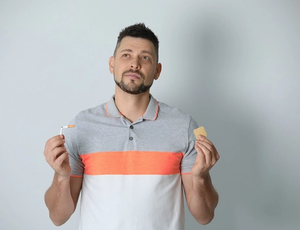
The Real Reason It’s So Hard To Quit Smoking
Nicotine is intensely addictive—any smoker will be able to tell you that. Some might even tell you smoking is harder to quit than any other drug or alcohol addiction. Some will tell you they quit years ago, decades even, and they still crave the occasional cigarette. Even though they may sound extreme, these are common anecdotal claims of past smokers.
But why is it that a smoking habit is so hard to kick? We dig deep into the psychology of nicotine addiction and why it sticks around for so long. Read on!
Smoking easily becomes part of a routine
The reality is that it is far more ingrained in our society than most other substances. This makes it accessible not only to purchase cigarettes but also to add them into our daily routine. So many smokers will associate certain places or times of the day, such as work breaks or social occasions with smoking. These times of the day become mental triggers, and without cutting them out, it can be incredibly difficult to break the associations. Fortunately, habits can be broken, and this can be the most proactive way to make sure you stick to your quitting journey.
Nobody wants to stop going to social occasions or stay indoors during breaks when it’s sunny outside—all because they’re trying to give up smoking. So how can we stop our brain from thinking that these regular occurrences go hand-in-hand with smoking?
The answer in making conscious decisions to avoid triggers within our regular routines. If you’re a routine smoker, the most important thing is to recognise what your triggers are and work backwards from there. For example, doing things like avoiding your mates who are heavy smokers (not forever, just for a little while), or taking breaks at a different time to others and finding another outdoor activity to occupy your time.
Nicotine levels rise and fall FAST
The way nicotine reacts with your body once you smoke a cigarette is very fast-paced. It only takes about 10 to 20 seconds for nicotine to reach your brain. This can quickly boost your mood, reduce stress and give you extra energy. The issue with that is that these heightened chemicals in your brain deplete quickly. Just 2 hours after your cigarette break, they’re down by 50%. As you become a more frequent smoker, your brain is able to adapt to the changes and compensates by normalising the ‘high’ of nicotine. This results in a compulsive need to smoke more often to feel any of the effects, and the drop from nicotine withdrawal becomes much more intense over time.
This cycle is common for most substance addictions. Your brain gets to a point where it believes that taking in the substance is the only way to feel ‘normal’ and any time you come off, it is unbearable. For this reason, the worst phase of the quitting journey is withdrawal. People often turn to nicotine replacement therapy as a way to gradually slow down nicotine intakes. Products such as Nicotrol can be an effective way to reduce the effects of nicotine withdrawals, as they release small amounts of nicotine into your body.
Nicotine withdrawal triggers stress and anxiety in the brain
Further research into nicotine withdrawal has found that not only does the cycle make you crave cigarettes; it also triggers a particular part of your brain—the part that houses your anxiety and stress levels! So, not only are you trying to avoid cravings while you’re on your quit smoking journey and your nicotine levels deplete, at the same time, the process also causes you to feel more stressed and anxious than normal.
These two factors combined cause nicotine withdrawal to become a much worse process than it sounds on paper and is often the cause of why people who attempt to quit ‘cold turkey’ most likely fail. It is important to be fully aware of what nicotine does to your brain chemistry if you’re trying to quit so that you can understand what you’re going through from an objective standpoint.
Quitting smoking triggers a state of ‘Anhedonia’
More recently, psychologists have discovered another reason why quitting smoking is as difficult a task as it is. By studying over a thousand smokers who were trying to quit, they concluded that nicotine withdrawal was strongly connected with a neurological state known as ‘anhedonia’. Anhedonia is the inability to feel pleasure in normally pleasurable activities, especially during social, recreation and performance areas of life. It is essentially a phase of mental numbness. But don’t worry—this fades over time.
The most important aspect to know about this experience is that those who lapse from quitting smoking the first time will experience anhedonia symptoms worse as they attempt to quit subsequent times. Basically, the second time you attempt to quit, anhedonia will hit you much worse, so it’s harder to quit smoking each time you try after you’ve relapsed.
This is a vicious cycle as people will commonly associate the state with their other nicotine withdrawal symptoms, and it can prompt people to resume their smoking habit in order to regain their pleasure sensors.
Find The Solution That’s Right For You
The fact that psychologists know this much about what goes on in our brains during the quitting smoking process is excellent news. More of our resources can be focused on figuring out specific treatments to aid people along their journey. At the moment, research shows that a tailored nicotine replacement therapy is one of the best methods for quitting smoking. Whether you find that Nicorette gum, patches or lozenges work best for you, there is a solution out there for everyone involving a mix of slow-release and rapid-delivery products.
To find out what NRT products are best for you, try our quiz today.
Related Article




